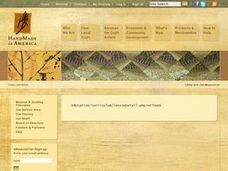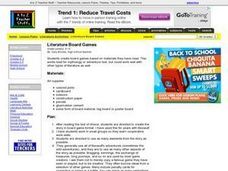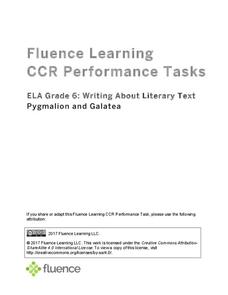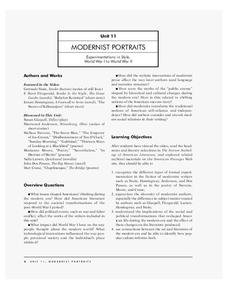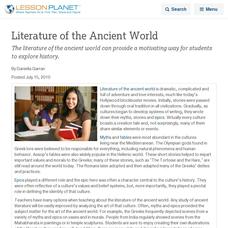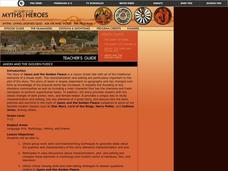Curated OER
Mythology Spreadsheet
Students read a large variety of myths and discuss the characters and their attributes found in mythology. Then they identify and learn to set up an appropriate spreadsheet program. Students also enter the data to the class spreadsheet...
Curated OER
Greek mythology (characteristics and features)
Students recognize the features and characteristics of myths, the role myths played in Greek culture, and choose a writing project. In this Greek mythology lesson, students are introduced to Greek mythology and work in cooperative...
Curated OER
Fantasy, Fables, Myths, Legends & Fairy Tales
Students identify the differences between fantasies, fables, myths, legends and fairy tales. In groups, they create their own versions of the different genres. They practice identifying the examples, as well.
Curated OER
Digital Photography and Mythology
Students use digital photography to create an exhibition based on a myth that is presented in a piece of classical art. They interpret a print of the myth motif artwork, read a text-selection of the myth then design and photograph a...
Curated OER
Odyssey
In this literature worksheet, students find the vocabulary terms from Homer's The Odyssey and the answers are found with the button found at the bottom of the page.
Curated OER
Literature Board Games
High schoolers create board games out of pieces of literature they have read. They work together to develop rules and elements of the game. They are to use as many elements of the story as possible. They play each game as a class.
Curated OER
Passport to Stories Around the World
Students read stories from various cultures and create a passport indicating the completion and comprehension of the story. The template for the passport is included. The lesson can be used for a broad range of ages depending on the...
Fluence Learning
Writing About Literary Text: Pygmalion and Galatea
Is it crazy to fall in love with your own work, or is that the purest love of all? Compare two renditions of the classic Greek myth Pygmalion and Galatea with a literary analysis exercise. After students compare the similarities and...
EngageNY
Leaving the Play: All’s Well That Ends Well
How does Shakespeare develop the theme of control in A Midsummer Night's Dream? Using the resource, scholars analyze the theme of parental control in the play and the Greek myth "Pyramus and Thisbe." Next, they talk to partners to...
Curated OER
Border Legends, Myth, & Folklore
Students examine the narrative forms and tales unique to the U.S.-Mexico border. They discuss the possible sociological meanings of these stories, and then write their own versions to demonstrate that they explain the forms.
Curated OER
Fairy Tales and Folklore Tell about....
Every elementary age child learns about the different genres of literature, this PowerPoint will give them a clear idea of what to look for when identifying Folklore and Fairy Tales. Each slide describe the characteristics of Folklore,...
Curated OER
Lunar Myths
Fourth graders explore the phases of the moon. In this moon instructional activity, 4th graders research myths regarding the moon and create a PowerPoint presentation to share their findings.
Curated OER
Importance of American Flag in American Literature
Betsy Ross - fact and myth. As an introduction to American Literature, class members become detectives and search web sites to find information about the flag, prominent places it has been displayed (on the moon, at ground zero, in...
Annenberg Foundation
Modernist Portraits
How did literature reflect people's attitudes in post-World War I America? A lesson explores the topic using a variety of activities. Individuals watch and respond to a video; read author biographies and engage in discussion; write...
Curated OER
Literature of the Ancient World
The literature of the ancient world can provide a motivating way for students to explore history.
Curated OER
Teaching Mythology Lessons in a Creative Way
The key to understanding mythology can lie in finding lesson plans that hook students on this fascinating part of history.
Curated OER
Graphs of the Heart
Students study Greek literature. In this Greek tragedies lesson, students explore the dance-dramas of Martha Graham. Students study the choreography that brings ancient Greek literature to life.
Curated OER
Using Words as a Way into Rick Riordan's The Lightning Thief
Use the Visual Thesaurus to predict the subject matter of Rick Riordan's book The Lightning Thief. A pre-reading activity encourages middle schoolers to use context clues and word meaning to discover what the book is about. After they...
Curated OER
Mountain Myths
Students become familiar with Native American myths and legends created to explain volcanic activity. They apply the clustering, writing process and peer-editing techniques to the writing of an original myth about Mount St. Helens
Curated OER
Fantasies and Myths
Fourth graders listen to the book, THE GIVING TREE and discuss what genre category they believe the story fits into and why. They read of of the myths on the website on the computers and then come back together as a group and discuss...
Curated OER
African Myths and What They Teach
Students identify and locate the continent of Africa on a globe or map. They locate on a classroom map of Africa the place of origin of the myths/stories being read in class.
They discover that the peoples of Africa and their stories are...
Curated OER
Forest Activity: The Forest as Inspiration for Literature
Pupils analyze the role of the forest in literature. They read various literature selections, analyze the role the forest played as a setting, character, or symbol, and complete a writing activity.
Curated OER
Myth Connections
Ninth graders present tales and myths in the oral tradition. They discuss the African method of telling a story where each member of the group tells a part of the story. They make up a composite hero and write a story that describes...
Curated OER
Jason and the Golden Fleece
Students read and analyze the classic Greek tale of "Jason and the Golden Fleece." They compare/contrast the story with modern works of literature and films, answer discussion questions, and retell the story in a modern-day setting.





